新思维综合英语第一册
新思维综合英语1模拟测试一
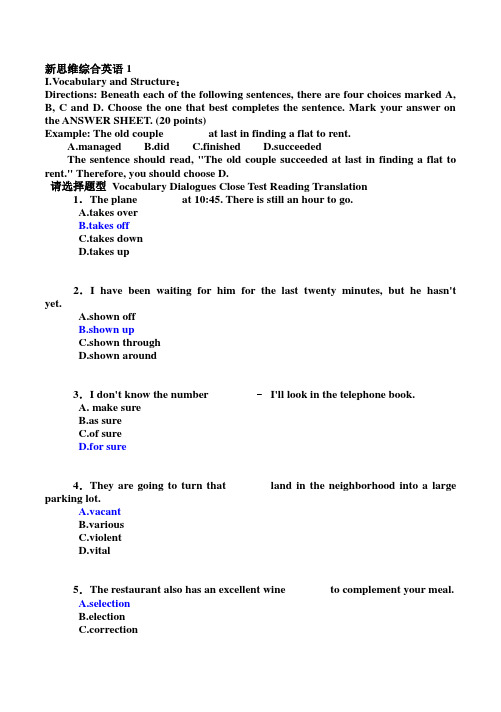
新思维综合英语1I.Vocabulary and Structure:Directions: Beneath each of the following sentences, there are four choices marked A, B, C and D. Choose the one that best completes the sentence. Mark your answer on the ANSWER SHEET. (20 points)Example: The old couple at last in finding a flat to rent.A.managedB.didC.finishedD.succeededThe sentence should read, "The old couple succeeded at last in finding a flat to rent." Therefore, you should choose D.请选择题型Vocabulary Dialogues Close Test Reading Translation1.The plane at 10:45. There is still an hour to go.A.takes overB.takes offC.takes downD.takes up2.I have been waiting for him for the last twenty minutes, but he hasn't yet.A.shown offB.shown upC.shown throughD.shown around3.I don't know the number–I'll look in the telephone book.A. make sureB.as sureC.of sureD.for sure4.They are going to turn that land in the neighborhood into a large parking lot.A.vacantB.variousC.violentD.vital5.The restaurant also has an excellent wine to complement your meal.A.selectionB.electionC.correctionD.reflection6.Could you tell me the tissues are, please?A.whatB.whereC.whichD.when7.How long?A. have you got marriedB.you got marriedC.have you been marriedD.did you marry8.You will find rice at every meal in the South of China.A.servedB.servingC.be servedD.serves9.She opened the door the fresh air to come in.A.ofB.forC.intoD.let10.All is a continuous supply of the basic necessities of life.A.that is neededB.what is neededC.the thing neededD.our needsII.Situational Dialogues:Directions: Choose A, B or C to complete each conversation, using the sentences below. Mark your answer on the ANSWER SHEET. (20 points)Example:- Oh, look. Joni Mitchell is in town.- .- What? She's one of the greatest folk singers in the world!Who's that? I've never heard of her.Sure, I'm in town.Yes, I'm glad she's coming.Answer A is correct because the conversation should read,"- Oh, look. Joni Mitchell is in town.- Who's that? I've never heard of her.- What? She's one of the greatest folk singers in the world!"请选择题型Vocabulary Dialogues Close Test Reading Translation11.–Thanks very much. You've been very helpful.–.A.No, thanks.B.You are right. You can say it again.C.Don't mention it. Any time.12.–How about joining us? It is really a wonderful feeling.–.A.Well, I was planning to work on Saturday. But I change my mind now.B.Great! It doesn't sound like that great when I was there last time.C.Really? I thought the steak was terrible.13.–Hello, Chris? This is Lee..–Oh, that's O.K. I was just setting the table.A.What are we going to have for dinner?B.I hope I'm not calling at dinner time.C.Jane invites us over for dinner tonight.14.–Do you know where Liberty Street is? –It's off Oak Street, near the park.–.–I don't know exactly. Perhaps every five minutes or so.A.The park? Which one do you mean?B.Do you have any idea where Pine Street is?C.By the way, do you know how often the Number 5 bus runs normally?15.–Could you tell me which bus goes to the Fine Arts Museum?—.A.Sorry, I've never been there.B.You can always take a taxi.C.I think No. 16 is OK.16.–Do you have any plans for the weekend?–.A.It will be fine on the weekend.B.It depends on the weather.C.I went to the cinema last weekend.17.–Do you know what you're going to order?–.A.It smells awful.B.It tastes delicious.C.I can't make up my mind.18.–If the weather is good, I might play tennis. What about you?–.A.What would you like order?B.I went to the cinema yesterday.C.I'm not sure. I may just stay home.19.–Do you ever go back to Cambridge?–.–I don't know exactly. Perhaps every five minutes or so.A.Not very often.B.Let's keep in touch.C.Not again.20.–How about working fifteen more minutes? Then we can order out for pizza.—.A.Sounds great. I am so hungry I could eat a horse.B.Good idea. I need to leave immediately.C.Let's move to other topics.III.Close Test:Directions: For each numbered blank in the following passage, there are four choices marked A, B, C and D. Choose the best one and mark your answer on the ANSWER SHEET. (20 points) 请选择题型Vocabulary Dialogues Close Test Reading TranslationHenry's job was to examine cars whichcrossed the frontier to make21that they werenot smuggling (走私) anything into the country.Every evening, except at weekends, he 22see a factory worker coming up the hill towardsthe frontier, pushing a bicycle with a big load ofold straw on it. When the bicycle reached thefrontier, Henry 23to stop the man and makehim take the straw off and untie it. Then he wouldexamine the 24very carefully to see if hecould find anything, after which he would look inall the man's pockets 25he let him tie thestraw again. The man would then put it on hisbicycle and go off down the hill with it. AlthoughHenry was always 26to find gold or jewelry orother valuable things hidden in the straw, henever found any.Then one evening, after he had looked27the straw as usual, he said to him,"Listen. I know that you are smuggling thingsacross this frontier. Won't you tell me what it isthat you are bringing into the country so 28?I'm an oldman, and today's my last day on thejob. Tomorrow I'm going to 29. I promisethat I shall not tell anyone if you tell me whatyou've been smuggling." The factory workerdid not sayanything for 30. Then he smiled,turned to Henry and said quietly, "Bicycles."21. A.known B.clearC.obviousD.sure--------------------------------------------------------------------------------22. A.would B.mustC.mightD.should--------------------------------------------------------------------------------23. A.had edC.wantedD.sure--------------------------------------------------------------------------------24. A.bicycle B.hillC.strawD.worker--------------------------------------------------------------------------------25. A.when B.beforeC.whileD.as--------------------------------------------------------------------------------26. A.thinking B.suspectingC.expectingD.insisting--------------------------------------------------------------------------------27. A.thoroughly B.throughC.downD.up--------------------------------------------------------------------------------28. A.carefully B.successfullyC.obviouslyD.silently--------------------------------------------------------------------------------29. A.return B.retreatC.retireD.rest--------------------------------------------------------------------------------30. A.short while B.a periodC.few minutesD.some timeIV. Reading ComprehensionDirections: Each of the passages below is followed by some questions. For each question there are four answers marked A, B, C and D. Read the passages carefully and choose the best answer to each of the questions. Mark your answer on the ANSWER SHEET. (20 points)请选择题型Vocabulary Dialogues Close Test Reading TranslationQuestions 31~35 are based on the Passage 1.Passage 1Learning the language of a country isn't enough. If you know the manners of your foreign friends, you will probably be surprised just how different they can be from your own.A visitor to India should remember it is impolite there to use the left hand for passing food at the table. The left hand is for washing yourself. Also in India, you might see a man shaking his head at another to show that he is disagreeing. But inmany parts of India a side-to-side movement of the head is to show agreement. In Bulgaria you shake your head to show "yes"—a nod shows "no".In Europe it is quite usual to cross your legs while sitting and talking to someone, even at an important meeting. But doing this could cause offence to a Thailander. Touching the head of a grown-up is also not done in Thailand.Knowing about manners is useful when you are traveling, and you also need to know the language used to express the customs.31. If you are staying in India, you'd better.A. not use your left hand to pass food at the tablee your left hand to pass food at the tableC.not use your left hand to wash yourselfe your left hand at all times32. To shake your head means "Yes.A.in IndiaB.in EuropeC.in BulgariaD.in Thailand33. You can easily make a Thailander angry by.A.touching his headB.crossing your legs while talking to himC.shaking your headD.nodding your head34. The writer thinks that to know about a country well one must.A. know the language of the countryB.know the manners of the countryC.know the manners better than the languageD.know both the language and the manners35.We can learn from the passage that.A.different countries have different mannersB.the manners in Thailand are the same as those in IndiaC.one should be careful not to cross legs in EuropeD.one should not touch a grown-up's head in IndiaIV. Reading Comprehension请选择题型Vocabulary Dialogues Close Test Reading TranslationQuestions 36~40 are based on the Passage 2.Passage 2Last night after dinner I told my family the bad news. I had this class assignment to monitor (监控)our use of energy at home for a week. Our family got an F.Tuesday night my brother watched the same two hour movie on his TV set that we were watching in the living room. Thursday Mom ran an entire dishwashing cycle for 3 cups, 2 plates, a knife and 3 little spoons. That's a lot of electricity and hot water down the drain(下水道).Dad drives 28 miles back and forth to work alone. Two men he works with live right nearby, and they could carpool (合伙使用汽车) and save about a thousand gallons of gas a year. And me, I'm guilty too. I went out and left the radio blaring(喇叭大声地响)in my room all Saturday morning.So last night at the dinner table we all agreed to do everything we could to conserve(节约)energy. Faster showers. Lower thermostats (温度调节器). Fuller care. It is a fact that this country's using up energy faster than we produce it. I read that we may run out of oil-forever-in thirty years. So terrible!Unless every person in every house on every block does his part, the future looks pretty dim.I'm getting more and more concerned about the future. Because that's where I'm going to be.36. The people in this family.A. wasted energy unconsciouslyB.had the radio on when they went outC.watched TV programs separatelyD.liked to use hot water while washing dishes37. It is a fact that.A.oil is getting less and lessB.the future is terrible with such a serious problemC.the government tries to solve the problem within several yearsD.the county will soon use up energy if we keep wasting like this38. If every person in every house.A.rides a bike instead of a car, everything will be OKB.stops using hot water washing dishes, we'll waste less energyC.makes efforts to save energy, the future will be brightD.has company while watching TV, nothing will go wrong39. What's the main idea that the author want to convey in this passage?A.There is a waste at home.B.To waste is a serious problem.C.Families will run out of energy.D.We should conserve energy.40. The suitable title for this passage is.A.What an Assignment!B.What a Waste!C.How to Save Energy?D.The Future is Dim.V. TranslationDirections: Put each of the following sentences into English or Chinese, using the word(s) given in the bracket if any. Write your answer on the ANSWER SHEET. (20 points)请选择题型Vocabulary Dialogues Close Test Reading Translation41. The attention to details assures you that the setting and service are as perfect as your meal, whether it's a quiet dinner for two, or a business lunch.参考答案:无论静谧的二人晚餐还是商务午餐,细致入微的服务都会保证这里的环境和服务与您所点的食物一样品质优良。
创新思维综合教程第一册 Book 1, Unit 5

Every advantage has its disadvantage
Unit Five Text
Modern City Life
有利必有弊
Do you like to live in a big city or in a small town?
Introductory remarks:
The Author’s Attitude towards Modern City Life ?
besides
In addition(to the names on the list),
there are six other applicants.
Practice Listening
• 1.Birds inhabit this island every year. • 2. -He is very likely to come late • 3. None could inhabit the place. • 4. I barely know her. • 5. That reminded me that I must go to see him. • 6.He kept in constant contact with his family while he was
10.FAocccoumsm:oda1ti)onUannddwerosrktavnisda wPiallsbseivareraVnogeidce 2) IdenbtiyftyhePCahsinseisveescVhoooilc. e in the text
3. The room was barely (bare) furnished when I rushed to see.
Conclusion: Only a madman would choose to
《新思维高职高专英语综合教程(第一册)》电子教案1 Unit 7
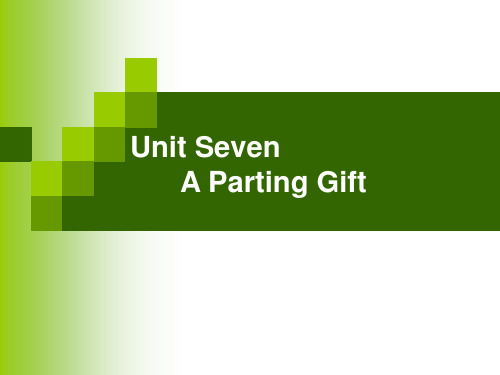
Dialogue
(On the street, Elizabeth ran across Joanna, her roommates in university. They went into a café.)
resume [rezju:'mei] n. a short summary or account of sth.简历;履历
leave for set out for a place出发前往 farewell [feə'wel] n. the act of saying goodbye to
somebody 告别;辞行
Unit Seven A Parting Gift
Contents
Section One Sounds of English Section Two Language Building
Dialogue One Dialogue Two Section Three Intensive Reading Section Four Know-how Sharing Section Five Information Exchanging
treat [tri:t] v. to pay for something that somebody/you will enjoy and that you do not usually have or do 招待;款待;请(客);买 (可享受的东西)
Find the Information I. Listen to the dialogue and find the information as quickly as possible.
新思维英语综合教程1
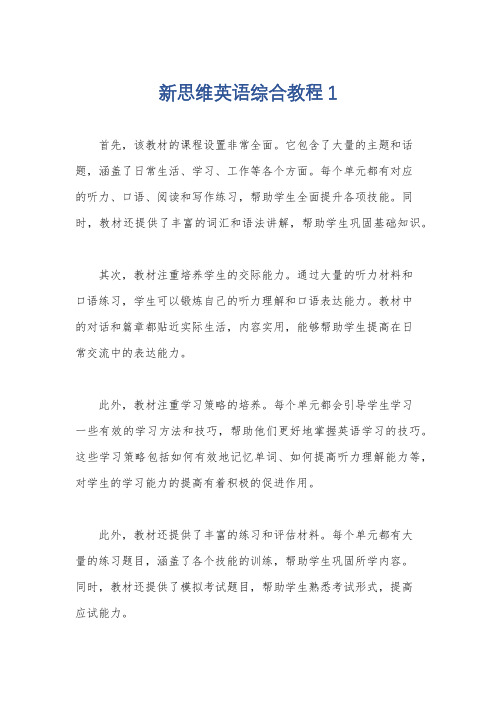
新思维英语综合教程1
首先,该教材的课程设置非常全面。
它包含了大量的主题和话题,涵盖了日常生活、学习、工作等各个方面。
每个单元都有对应
的听力、口语、阅读和写作练习,帮助学生全面提升各项技能。
同时,教材还提供了丰富的词汇和语法讲解,帮助学生巩固基础知识。
其次,教材注重培养学生的交际能力。
通过大量的听力材料和
口语练习,学生可以锻炼自己的听力理解和口语表达能力。
教材中
的对话和篇章都贴近实际生活,内容实用,能够帮助学生提高在日
常交流中的表达能力。
此外,教材注重学习策略的培养。
每个单元都会引导学生学习
一些有效的学习方法和技巧,帮助他们更好地掌握英语学习的技巧。
这些学习策略包括如何有效地记忆单词、如何提高听力理解能力等,对学生的学习能力的提高有着积极的促进作用。
此外,教材还提供了丰富的练习和评估材料。
每个单元都有大
量的练习题目,涵盖了各个技能的训练,帮助学生巩固所学内容。
同时,教材还提供了模拟考试题目,帮助学生熟悉考试形式,提高
应试能力。
总的来说,《新思维英语综合教程1》是一本很好的英语综合
教材。
它全面涵盖了各个技能的训练,注重培养学生的交际能力和
学习策略,同时提供了丰富的练习和评估材料。
通过使用这本教材,学生可以全面提升自己的英语能力,更好地应对日常生活和学习中
的英语使用。
新思维综合英语1模拟试题四
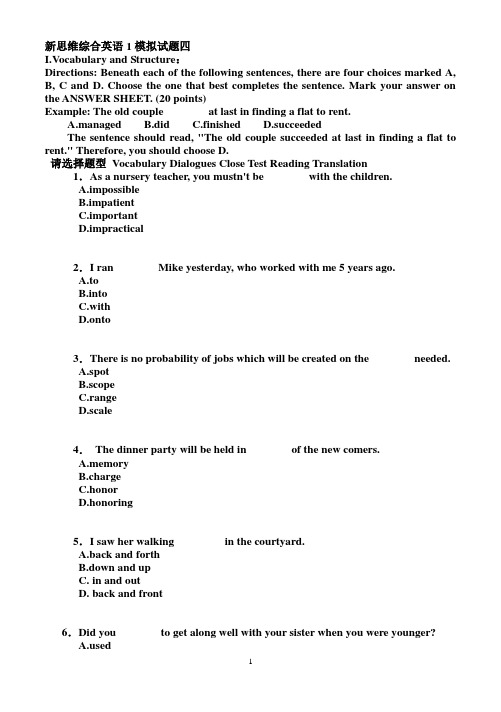
新思维综合英语1模拟试题四I.Vocabulary and Structure:Directions: Beneath each of the following sentences, there are four choices marked A, B, C and D. Choose the one that best completes the sentence. Mark your answer on the ANSWER SHEET. (20 points)Example: The old couple at last in finding a flat to rent.A.managedB.didC.finishedD.succeededThe sentence should read, "The old couple succeeded at last in finding a flat to rent." Therefore, you should choose D.请选择题型Vocabulary Dialogues Close Test Reading Translation1.As a nursery teacher, you mustn't be with the children.A.impossibleB.impatientC.importantD.impractical2.I ran Mike yesterday, who worked with me 5 years ago.A.toB.intoC.withD.onto3.There is no probability of jobs which will be created on the needed.A.spotB.scopeC.rangeD.scale4.The dinner party will be held in of the new comers.A.memoryB.chargeC.honorD.honoring5.I saw her walking in the courtyard.A.back and forthB.down and upC. in and outD. back and front6.Did you to get along well with your sister when you were younger?edingeD.to use7.I am going with Jim and some of my good friends on Saturday.A.fishingB.for fishingC. fishedD.fish8.that they will be denied a raise, many people never request one.A.FearingB.Being fearedC.FearedD.Being fearing9.When, before you start a meal, you will be given a basket with a hot towel in it.A.dine outB.dining outC.dined outD.you dining out10.Did you have in mind?A.special anythingB.anything specialC.nothing specialD.special nothingII.Situational Dialogues:Directions: Choose A, B or C to complete each conversation, using the sentences below. Mark your answer on the ANSWER SHEET. (20 points)Example:- Oh, look. Joni Mitchell is in town.- .- What? She's one of the greatest folk singers in the world!Who's that? I've never heard of her.Sure, I'm in town.Yes, I'm glad she's coming.Answer A is correct because the conversation should read,"- Oh, look. Joni Mitchell is in town.- Who's that? I've never heard of her.- What? She's one of the greatest folk singers in the world!"请选择题型Vocabulary Dialogues Close Test Reading Translation11.–How about joining us? It is really a wonderful feeling.–.A.Well, I was planning to work on Saturday. But I change my mind now.B.Great! It doesn't sound like that great when I was there last time.C. Really? I thought the steak was terrible.12.–Do you know what time it is?–.A.It's time to have our lunch.B.It's half past twelve. We have to leave here now.C.What do you want to do by asking that?13.–Do you mind my opening the window? It's so hot today.–.A.Yes, you can do.B. Yes, it doesn't matter.C.No, not at all.14.–May I help you find something, or are you just looking?–.A.I am trying to find something for my daughter.B.No, dinner is nearly ready.C.That's right. I'll have that blue one.15.–How do I get to the train station from here?–.A.That's very difficult to talk about.B.You can either drive or take a bus.C.You can't go there, but it's a long way to go.16.–Do you live in Chicago now?–.A.Chicago is a busy and noisy city.B.Chicago is far away from here.C.Well, I'm thinking of moving here.17.–I've got 2 tickets for the match. Would you like to go with me?–.A.How about the match last night?B.The match must be exciting.C.Why not? Let's go together.18.–Let me help you open that bottle.–.A.Never mind. I have no idea about it.B.Thanks. I really appreciate it.C.Thank you for telling me about it19.–Have you visited Hong Kong?–.A.Sorry, I'm planning to go to New York.B.No, but I've heard it's an exciting city.C.Yes, it's a long way to my hometown.20.–I'm going to the grocery store. Is there anything you need?—.A. Could you pick up a bottle of wine?B.No, I don't care.C. I have already visited them.III.Close Test:Directions: For each numbered blank in the following passage, there are four choices marked A, B, C and D. Choose the best one and mark your answer on the ANSWER SHEET. (20 points) 请选择题型Vocabulary Dialogues Close Test Reading TranslationA land free from destruction, plus wealth, natural resources, and labor supply(劳动力供应)all these were important21in helping England become the center for the Industrial Revolution. But they were not enough. Something22was needed to start the industrial progress. That “something special”was men –creative individuals who could invent machines, find new23of power, and establish business organizations to reshape society.The men who created the machines of the Industrial Revolution24from many backgrounds and many occupations. Many of them were better inventors than scientists. A man who is a 25scientist is primarily interested in doing his research accurately. He is not necessarily working 26that his findings can be used.An inventor, or one interested in applied science, is usually trying to make something that has a concrete27. He may try to solve a problem by using theories of science or by experimenting through trial and error. Regardless of his method, he is working to obtain a28result: the construction of a harvesting machine, the burning of a light bulb, or one of those other objects.Most people who29the machine of the Industrial Revolution were inventors, not trained scientists. A few were both scientists and inventors. Even those, 30little or no training in science, who made some inventions must have benefited from the groundwork (基础) scientists have laid.21. A.cases B.reasonsC.factorsD.situations22. A.else B.nearC.extraD.similar23. A.origins B.sourcesC.basesD.discoveries24. A.came B.arrivedC.stemmedD.appeared25. A.genuine B.practicalC.pureD.clever26. A.now B.andC.orD.so27. A.plan B.ideaC.theoryD.means28. A.single B.soleC.specializedD.specific29. A.proposed B.developedC.suppliedD.offered30. A.by B.withC.withoutD.forIV. Reading ComprehensionDirections: Each of the passages below is followed by some questions. For each question there are four answers marked A, B, C and D. Read the passages carefully and choose the best answer to each of the questions. Mark your answer on the ANSWER SHEET. (20 points)请选择题型Vocabulary Dialogues Close Test Reading TranslationQuestions 31~35 are based on the Passage 1.Passage 1The water we drink and use is running short in the world. We all have to learn how to stop wasting our limited water. One of the steps we should take is to find ways of reusing it. Experiments have already been done in this field.Today in most large cities, fresh water is used only once, and then it runs into waste system. But it is possible to pipe the used water to a purifying factory. There it can be filtered and treated with chemicals so that it can be used again, just as it were fresh from a spring.But even if every large city purified and reused its water, we still would not have enough. Then we could turn to the oceans. All we'd have to do to make use of the seawater on earth is to get rid of the salt. This process is called desalinization, and it is already in practice in many parts of the world.31. The way to stop wasting our limited water is to according to the passage.A. do experiments with waterB.purify the used water and reuse ite fresh water once againD.make use of seawater32.The following tells us how to purify the used water. The first step of the purifying process is to.A.have the used water filteredB.put chemicals in itC.pipe it to the usersD.pipe the used water to be purified to a factory33. There wouldn't be enough water for us if we didn't.A.turn to the oceans for more waterB.reuse used water and make use of seawaterC.desalt seawaterD.take steps to reuse all water on earth34. The word "it" in the last sentence refers to.A. seawaterB.purified waterC.the process of getting rid of the salt in seawaterD.the process of collecting salt from the sea oceans35.The best title for the passage is.A.How to Reuse WaterB.Two Solutions to the Problem of Water ShortageC.Stop Wasting Our Limited WaterD.How to Make Use of SeawaterIV. Reading Comprehension请选择题型Vocabulary Dialogues Close Test Reading TranslationQuestions 36~40 are based on the Passage 2.Passage 2Have you ever noticed advertisements which say “Learn a foreign language in six weeks, or your money back! From the first day your pronunciation will be excellent. Just send…”and so on? Of course, it never happens quite like that. The only language that is easy to learn is the mother tongue. Think how much practice that gets! Before the Second World War people usually learnt a foreign language in order to read the literature of the country. Now speaking a foreign language is what most people want. Every year many millions of people start learning one.Some people try at home, with books and records or tapes; some use radio or television programmes; others go to evening classes. If they use the language only twice or three times a week, learning it will take a long time. A few people try to learn a language fast by studying for six or more hours a day. It is clearly easier to learn the language in the country where it is spoken. However, most people cannot afford this, and for many it is not necessary. They need the language in order to do their work better. For example, scientists and doctors chiefly need to be able to read books and reports in the foreign language. Whether the language is learnt quickly or slowly, it is hard work. Machines and good books will help, but they cannot do the student's work for him.36. The advertisements say it would be easy to.A. speak your native language betterB. keep in mind any foreign languageC. learn a foreign language within several weeksD. learn by heart a foreign language37. Nowadays most people want to learn according to the text.A.about the country where a language is spokenB.to speak a foreign languageC.to read essays in the foreign languageD.to write in the foreign language38. Before the 2nd World War people usually learnt a foreign language in orderto.municate with their foreign friendsB.read the foreign newspaperC.read the literacy works of the countryD.talk with their foreign friends39. If you only use the language twice or three times a week, .A.it is impossible to learn it wellB.it will take a long time to learn the foreign languageC.you will never learn the language wellD.perhaps you will learn harsh language40. No matter how quickly or slowly you want to learn a foreign language, you need to.A.read booksB.read reportsC.visit the countryD.work hardV. TranslationDirections: Put each of the following sentences into English or Chinese, using the word(s) given in the bracket if any. Write your answer on the ANSWER SHEET. (20 points)请选择题型Vocabulary Dialogues Close Test Reading Translation41. Graphologists believe that you can learn a lot about people's personalities by looking at the way they write.参考答案:笔迹专家们认为他们可以根据人们写字的方式看出他们的个性来。
高职高专英语 新思维综合教程 第一册 答案
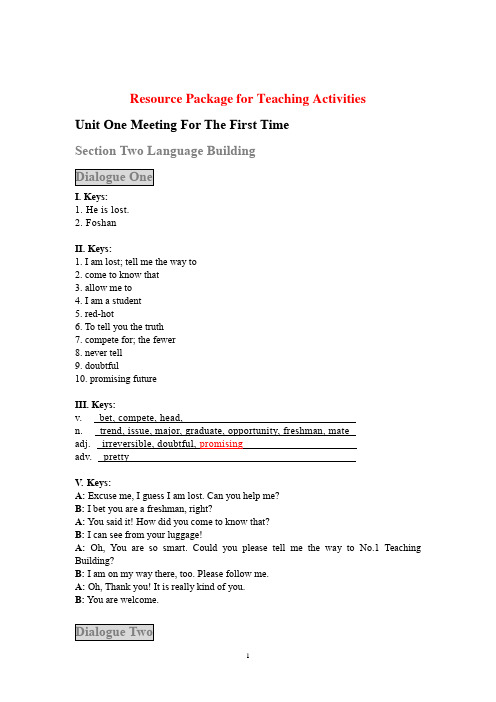
Resource Package for Teaching ActivitiesUnit One Meeting For The First TimeSectionT woLanguageBuildingI. Keys:1.He is lost.2. FoshanII. Keys:1. I am lost; tell me the way to2. come to know that3. allow me to4. I am a student5. red-hot6. To tell you the truth7. compete for; the fewer8. never tell9. doubtful10. promising futureIII. Keys:v. bet, compete, head, _________n. trend, issue, major, graduate, opportunity, freshman, mateadj.irreversible, doubtful, promisingadv.prettyV. Keys:A: Excuse me, I guess I am lost. Can you help me?B:I bet you are a freshman, right?A:Y ou said it! How did you come to know that?B:I can see from your luggage!A:Oh, Y ou are so smart. Could you please tell me the way to No.1 Teaching Building?B:I am on my way there, too. Please follow me.A: Oh, Thank you! It is really kind of you.B: Y ou are welcome.1. There comes2. come and meet3. Guess what4. dreaming of having a walk; taking some photos5. hot and humid6. food paradise7. your taste; your view8. feature snacks9. wateringIII. Keys:1. feature2. cuisine3. dumpling4. mate5. snack6. satisfy7.absolutely8. soupIV. Keys:Right Order: __5__ - __1__ - __6__ - __2__ - __7__ - _3__ - __9__ - _4__ - _8__V. Keys:1. I am from Fujian. Have you ever been to Fujian before?2. It looks like you’ve found your soul mate.3. I always dream of reading that book.4. We just need some time to get used to campus life.5. How do you like Chinese tea?6. The most important thing is to be honest.7. She not only does well in movies, but also is good at essay writing.8. Can you name all the plants in this garden?9. Chocolate is my favorite snack.10. The Y ellow River is the second longest river in China.Section Three Intensive ReadingI. Keys:1. “Miss”is a title used with the name of an unmarried woman or kept by a married woman for professional reasons; “Mrs.”is a title that comes before the name of a married woman; and“Ms.”is a title that comes before the name of a woman whether married or not.2. Open3. Feminist is used to refer to a person who supports the belief that women should have the same rights and opportunities as men.II. Keys:1. E2. A3.F4.B5.G6.C7.H8. D1. fashionable2. handy3. using4. marital5. editors6. used7. individuals8. identified9. relationship 10. official IV. Keys:1. just about every day2. was asked to fill in a job application form3. found that none of them had a clue either4. I don’t care what other people think5.i t’s a sign of respect6. Y ou remind meV. Keys:1. In →On Sunday morning2. asouth→asouth3. play →playing4. around world→around the world5. tallest→the tallest6. a interesting→an interesting; on the TV→on TV.7. give→gives; many advices→much advice8. such→such a; like→likes9. are→is; what→that10. planing→planning; furnitures→furnitureSection FiveInformation ExchangingI. Keys:Unit Two Fashion And ShoppingSectionT woLanguageBuilding1. No, he doesn’t. Because he prefers to actually see and touch what he’s buying before he pays for it.2. No. Because he is a little worried about the security.II. Keys:1. you yourself2. see and touch3. a little worried about4. only available; certain5. reallyconvenient6. the best way to do shopping7. get out and interactIII. Keys:1. E2. A3.F4. G5. C6. B7.D8. HIV. Keys:1. password2. purchase3. reputable4. touching5. interact6. available7. security8. misleading9. studio 10. detailsV. Keys:A:Do you do a lot of online shopping?B:No. I prefer to go to a department store or supermarket.A:Why? I think online shopping is very convenient!B: But I’m a little worried about its security.A:It would be OK if you choose those reputable companiesB:Really?A:Sure!B:I heard that online shopping can help us save lots of money?A:Of course! Because the online commodity is much cheaper than what is sold in a supermarket.B:That’s great! I’ll do online shopping next time!II. Keys:1. a real big headache2. worth doing3. pleasure4.a good choice5. comes with6. the latest7. a good taste8. recover; from9. helped a lot10. mentionIII. Keys:1. headache2. worth3. pleasure4. design5. improvement6. control7. latest8. model9. taste 10.choiceCard BY ou are expecting an order of men’s casual sportswear. Student A, who is working in themanufacture,is calling you.Elements:Tell about the order you are expecting from Student A. Complications:1) Give requirements of the quantity and color for Catalogue Number FS23 products and Catalogue Number FT678 products.2) Ask aboutthe shipment date.Y our partner will speak first. Listen, then think and respond to what he or she says.Section Three Intensive ReadingI. Keys:2. Duty-free shopsare retail shopswhere people do not need to pay local or national taxes and duties.3. Duty-free shops are often found in the international zone of international airports or sea ports.II. Keys:1. H2. A3.F4.B5.J6.I7.C8.G9.E 10. DIII. Keys:1. It was in 1947. And it was designed to provide a service for Trans-Atlantic airline passengers travelling between Europe and North America.2. It’s still in service today.3. It can be found in the international zone of international airports or sea ports; on several border crossings between the United States and Canada; in central business districts in Japan; and in the King Power chain in Thailand.4. They should ask for the current limit on liquids in hand baggage when buying duty-free alcohol or perfume.5. No. The pricesmay vary, which depend on the presence or absence of nearby competition, andthe cost of buyer convenience.IV. Keys:1. went to→She has been in Japan since last week.2. claim→A VA T refund may be claimed at the airport by visitors.3. was established→The world’s first Duty-free shop has been operatedsince 1947.4. changed→The limitationhas beenchangedsince 2000.5. are→Several Duty-free shops have been set for car travelers between the United States and Canada.Unit Three Travel ArrangementSectionT woLanguageBuildingI. Keys:1. They asked foran aisle seat and a window seat, both in the non-smoking section.2. He has airplane ears.II.Keys:1. right counter2. seat preferences3. an aisle seat; non-smoking section4. boarding passes5. smoking is not allowed6. check the menu card; make your meal selections7. a choice of entrées8. toastIII.Keys:1. check in2. non-smoking3. clearly4. swallowing5. allowed6. served7. toast8. prefer9. selections10. boardingIV.Keys:1. in2. in3. to4. with5. For6. with7. in8. to9. In10.offV.Keys:1. 请问,是在这里办理飞往伦敦的5860航班的登记手续么?2. 您对座位有什么偏好么?3.我们想在无烟区要一个靠窗的和一个靠走道的座位。
新思维综合英语第一册第四单元参考讲义汇总
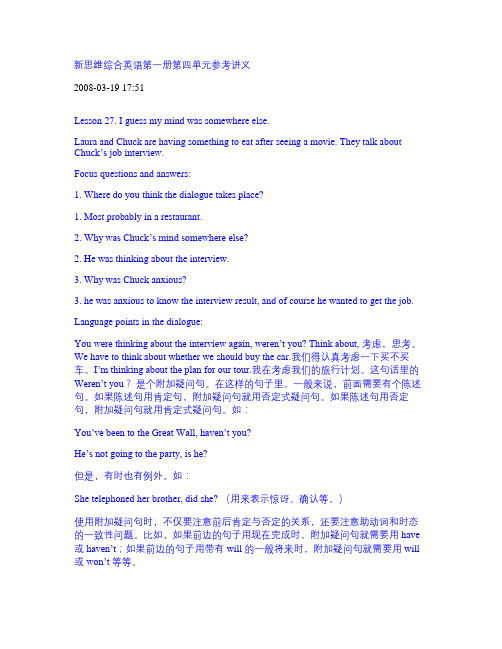
新思维综合英语第一册第四单元参考讲义2008-03-19 17:51Lesson 27. I guess my mind was somewhere else.Laura and Chuck are having something to eat after seeing a movie. They talk about Chuck’s job interview.Focus questions and answers:1. Where do you think the dialogue takes place?1. Most probably in a restaurant.2. Why was Chuck’s mind somewhere else?2. He was thinking about the interview.3. Why was Chuck anxious?3. he was anxious to know the interview result, and of course he wanted to get the job. Language points in the dialogue:You were thinking about the interview again, weren’t you? Think about, 考虑,思考。
We have to think about whether we should buy the car.我们得认真考虑一下买不买车。
I’m thinking about the plan for our tour.我在考虑我们的旅行计划。
这句话里的Weren’t you?是个附加疑问句。
在这样的句子里,一般来说,前面需要有个陈述句。
如果陈述句用肯定句,附加疑问句就用否定式疑问句。
如果陈述句用否定句,附加疑问句就用肯定式疑问句。
如:You’ve been to the Great Wall, haven’t you?He’s not going to the party, is he?但是,有时也有例外。
新思路大学英语综合教程第一册(第四版)课件Section A, Unit 1

BOOK1
Unit1
Main ideas of each paragragh of Text A
Para. 5 College is _m__o_re__th_a_n_f_u_n___. Para. 6 _E_x_p_e_ri_e_n_c_es_ to find the _p_u_rp_o_s_e of college education. Para. 7 _E_x_a_m__p_le_s_o_f_r_e_a_s_o_n_s _ for entering college. Para. 8 To experiment and consider the purpose for college education and its significance to their future life.
BOOK1
Unit1
Effects:
The narrator describes what “you” do and lets you into your own thoughts and background.
In books popular with younger readers, it allows the reader to “be” the central character in the story provides an immersive(沉浸式) reading experience, enhancing what is at stake for the character and reader.
BOOK1
Unit1
Task 2:Text to Life
Directions: Discuss with a partner the following questions. Share your thoughts and comments with the class. Do you like your major? Why did you choose your major? Do you want to choose a job in related career fields? Do you think it is possible to combine profession and passion?
新思维综合英语1Unit5
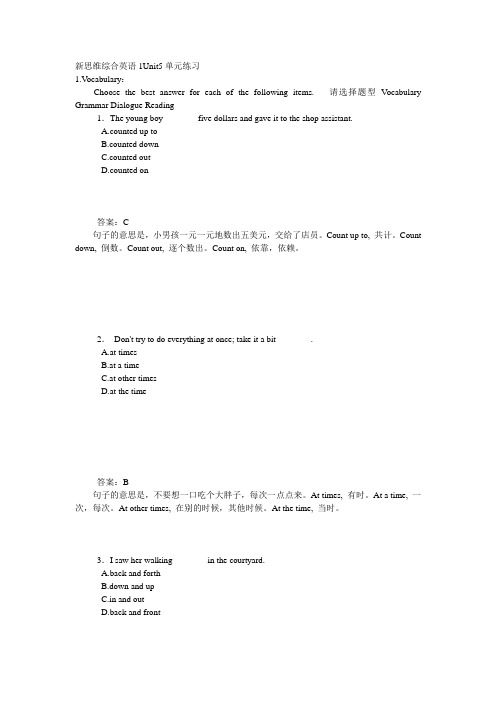
新思维综合英语1Unit5单元练习1.V ocabulary:Choose the best answer for each of the following items. 请选择题型Vocabulary Grammar Dialogue Reading1.The young boy five dollars and gave it to the shop assistant.A.counted up toB.counted downC.counted outD.counted on答案:C句子的意思是,小男孩一元一元地数出五美元,交给了店员。
Count up to, 共计。
Count down, 倒数。
Count out, 逐个数出。
Count on, 依靠,依赖。
--------------------------------------------------------------------------------2.Don't try to do everything at once; take it a bit.A.at timesB.at a timeC.at other timesD.at the time--------------------------------------------------------------------------------答案:B句子的意思是,不要想一口吃个大胖子,每次一点点来。
At times, 有时。
At a time, 一次,每次。
At other times, 在别的时候,其他时候。
At the time, 当时。
3.I saw her walking in the courtyard.A.back and forthB.down and upC.in and outD.back and front答案:A英语中有些表示相反概念的词语是可以由and 连接组成固定用法的,如:back and forth, 在不同地方之间来回地;up and down, 在某物上面来来去去;in and out, 时进时出于(某处)。
新思维大学英语第一册unit1Education
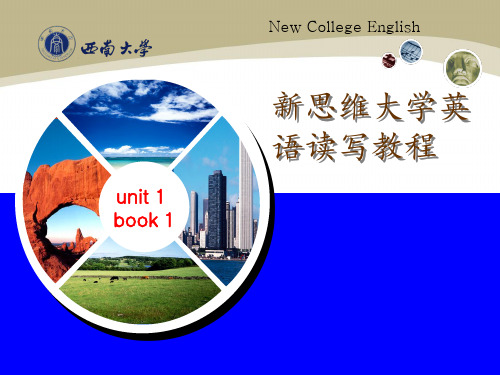
click here to watch a video clip.
After-watching Questions:
1. What are your ideas about college education? What's the meaning of it?
unit 1 book 1
New College English
新思维大学英 语读写教程
Unit 1 Education
Sayings On Education
◆ If a man empties his purse into his head, no man can take it away from him; An investment in knowledge always pays the best interest.
2) ______________ Researches have shown that people who go to college or h ave access to higher education, tend to earn more than the on es who have studied only up to the school level. Although, th is is not a hard and fast rule and exceptions are always there. But for the majority, as the education levels go up, the salari es also go higher and vice versa. Perhaps, the most important benefit of college education is that it gives the person access to a better life in his later years.
新思维综合英语第一册第四单元参考讲义汇总

新思维综合英语第一册第四单元参考讲义2008-03-19 17:51Lesson 27. I guess my mind was somewhere else.Laura and Chuck are having something to eat after seeing a movie. They talk about Chuck’s job interview.Focus questions and answers:1. Where do you think the dialogue takes place?1. Most probably in a restaurant.2. Why was Chuck’s mind somewhere else?2. He was thinking about the interview.3. Why was Chuck anxious?3. he was anxious to know the interview result, and of course he wanted to get the job. Language points in the dialogue:You were thinking about the interview again, weren’t you? Think about, 考虑,思考。
We have to think about whether we should buy the car.我们得认真考虑一下买不买车。
I’m thinking about the plan for our tour.我在考虑我们的旅行计划。
这句话里的Weren’t you?是个附加疑问句。
在这样的句子里,一般来说,前面需要有个陈述句。
如果陈述句用肯定句,附加疑问句就用否定式疑问句。
如果陈述句用否定句,附加疑问句就用肯定式疑问句。
如:You’ve been to the Great Wall, haven’t you?He’s not going to the party, is he?但是,有时也有例外。
新思维高职高专英语汇总
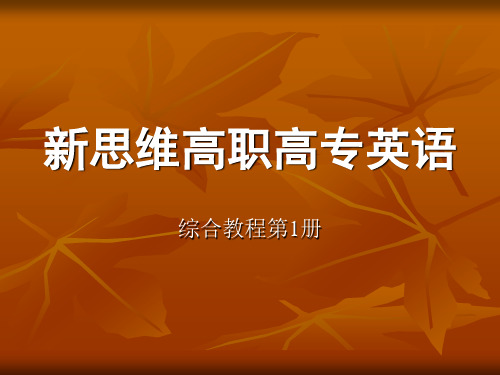
以o结尾的 无生命的 +s radios,zoos,pianos,photos
注意:
以f或fe结尾的名词,多数变f为v后加s,但有些词只加s,如: roofs,chiefs,proofs 不规则名词基本没有规律可循,需要积累: (1)变内部原因 foot-feet man-men tooth-teeth mouse-mice (2)词尾加-en child-children ox-oxen (3) 形式不变 deer-deer fish-fish sheep-sheep
20-90 Twentieth,thirtieth,fortieth,fiftieth,sixtieth,sevent ieth,eightieth,ninetieth 21-99 Twenty first 21 Thirty third 33 Ninety ninth 99 100 hundredth
(P15) 1、Excuse me,may l have a look at the desk lamp? 2、The color of this pair of trousers is good,but I don’t like the style. 3、My younger brother likes white T-shirts. 4、Have you longer waistband? 5、May I try this pair of shoes on? 6、Can you discount? P16 T T T T F
P5 II 1、Have you affirmed the reservation? 2、Do you have any luggage? 3、What else to do before departing? 4、The rest is our job. I 1、taxi 2、accelerate 3、passport 4、lounge
新思维职业英语综合教程 1各单元课件 ppt Unit 1
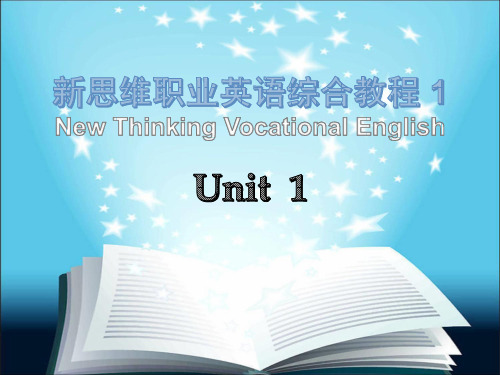
➢ volunteer n. 自告奋勇者
Script
Key
Back
Dialogues
Listen to the dialogues twice and choose the best answer to each question from the four choices marked A, B, C and D.
Your interpersonal strength is just OK, but you will not mix well with your peers. So come on!
60<S≤80 80<S≤100
Your interpersonal strength is good to make your communication with your peers smooth.
Back
Situational Dialogues
Activities
J: Please excuse me for being late. Today is Teachers’ Day. I went to buy some flowers for you, Mrs. Wang. But the flower shop doesn’t open until 8 o’clock. (smile and give the flowers to Mrs. Wang) Happy Teachers’ Day! W:
Back
Situational Dialogues
Activities
(W=Mrs. Wang, E=Eric, J=Jim) W: Class begins. Is everyone present? E : Everyone is here except Jim. (Just then Jim comes.) J : May I come in? W: Come in please. Why are you late today?
新思维综合英语第一册复习过程
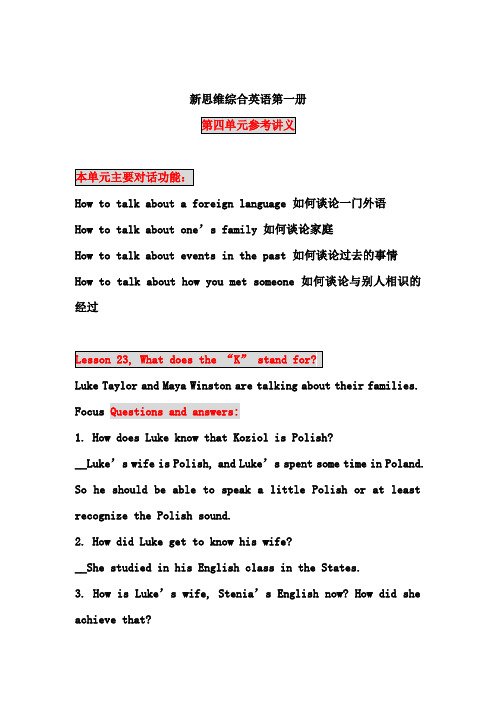
新思维综合英语第一册How to talk about a foreign language 如何谈论一门外语How to talk about one’s family 如何谈论家庭How to talk about events in the past 如何谈论过去的事情How to talk about how you met someone 如何谈论与别人相识的经过Luke Taylor and Maya Winston are talking about their families. Focus Questions and answers:1. How does Luke know that Koziol is Polish?__Luke’s wife is Polish, and Luke’s spent some time in Poland. So he should be able to speak a little Polish or at least recognize the Polish sound.2. How did Luke get to know his wife?__She studied in his English class in the States.3. How is Luke’s wife, Stenia’s English now? How did she achieve that?__She speaks English almost perfectly now. She worked so hard on her English (while she was learning English).4. Where are Maya’s relatives now? What language do Maya’s parents speak at home?___They are all living in the States now. Maya’s parents speak English now because in the dialogue, Maya says that her father used to speak Polish, and her mother forgot all other languages since she learned English. (所以他们家就说英语了。
新思维综合英语(1) Unit 10(6672)PPT课件
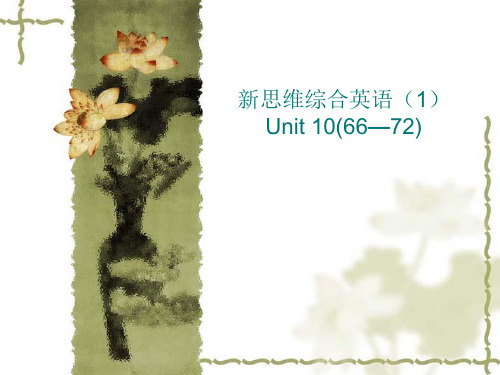
Language points in the dialogue
❖ How does this sound? 1. “这个听起来怎样?”一般来说这句话是个引子, 好让对方注意自己接下来要说的话。人们有时也会 说Listen作为开场白。 2. sound在这里是一个半系动词,后面接表语,如: It sounds great to me. 对表语提问的时候要用how。 如:How are you feeling now? I feel better.
❖ 本课的两段对话中还出现了下列嵌入式疑问句: (In Dialogue A) (1) Does it say how much it is? (2) Do you have any idea where that is? (In Dialogue B) (3) Do you happen to know how often it runs during rush hour? (rush hour = peak hour高峰期) 学习一个常用句型:Do you know + 嵌入式疑问句。 以上三句话可变成: (1) Do you know how much it is? (2) Do you know where that is? (3) Do you know how often it runs during rush hour?
❖B 1. What’s more about the one-bedroom apartment for $650 a month?
2. How is the public transportation?
3. Will Debbie accept the studio apartment? Why or why not?
- 1、下载文档前请自行甄别文档内容的完整性,平台不提供额外的编辑、内容补充、找答案等附加服务。
- 2、"仅部分预览"的文档,不可在线预览部分如存在完整性等问题,可反馈申请退款(可完整预览的文档不适用该条件!)。
- 3、如文档侵犯您的权益,请联系客服反馈,我们会尽快为您处理(人工客服工作时间:9:00-18:30)。
新思维综合英语第一册How to talk about a foreign language 如何谈论一门外语How to talk about one’s family 如何谈论家庭How to talk about events in the past如何谈论过去的事情How to talk about how you met someone如何谈论与别人相识的经过Luke Taylor and Maya Winston are talking about their families.1.How does Luke know that Koziol is Polish?__Luke’s wife is Polish,and Luke’s spent some time inPoland. So he should be able to speak a little Polish or at least recognize the Polish sound.2.How did Luke get to know his wife?__She studied in his English class in the States.3. How is Luke’s wife,Stenia’s English now? How did sheachieve that?__She speaks English almost perfectly now.She worked so hard on her English(while she was learning English).4. Where are Maya’s relatives now?What language do Maya’s parents speak at home?___They are all living in the States now.Maya’s parents speak English now because in the dialogue,Maya says that her father used to speak Polish,and her mother forgot allother languages since she learned English. (所以他们家就说英语了。
)What an unusual necklace!是个感叹句,What a …后边一般跟名词性短语。
如:What an interesting story(it is)!这个故事多有趣呀!What a splendid performance! 演出多精彩啊!Stand for代表,表示。
如:What does“K”stand for? K 的意思是什么?PE stands for physical education. PE 表示体育课的意思。
在西方国家里,女孩子长大结婚后一般要改用丈夫的姓氏,Maiden name指女孩结婚前所用的姓。
The States(S大写),指the United States. 口语中,人们谈起美国时,用得更多的是the States 或America, 来代替the USA.Which language do you speak at home,English or Polish?选择疑问句,疑问词用which,也可以说What language(s)do you speak?如果问话人知道你会讲多种不同外语,会用languages来提问。
Speak讲(一种语言)。
How many languages can he speak? Used to do sth,过去常常做某事。
现在已经没有这习惯了。
I used to smoke a lot. Work hard, 努力工作,认真工作。
Be good at sth.在某方面很擅长,有某方面能力。
She is good at languages. 她有语言天赋。
She still has a very slight accent,but you can hardly tell she’s foreign.她仍然有一点点口音,不过你几乎分辨不出她是外国人了。
Accent口音,腔调,someone with a different accent不同口音的人。
Slight微小的,轻微的。
She’s got a slightheadache.她有点(轻微的)头痛。
Tell区分,辨别。
They look exactly the same –how can you tell which is which?他们看起来一模一样,你怎么能分辨出哪个是哪个呢?动词tell当“区分、辨别”讲时,一般用在tell sb /sth from sb/sth这样的结构中。
如:Can you tell Jane from her twin sister?你能把Jane 和她的双胞胎妹妹分辨开吗?Hardly几乎不,几乎没有。
I’m so tired I can hardly walk any further.我太累了,几乎一步也走不动了。
学习时需要注意这类含有否定意义的副词,在句子中使用时,避免双重否定。
比如,刚才这句话就不能说成 I’m so tired I can not hardly walk any further. (错句)Was either of your parents born in Poland?Yes,they both were.你父母有谁是在波兰出生的吗?是的,他们都是。
Either of…二者之一。
后面常常接两个方面、两件事情或两个人,相关的动词往往用单数。
Either of the two phrases is acceptable.两个短语哪个都可以接受。
Either …or…常常连用,表示“二者之中任选其一”。
H e must be either mad or drunk. 他不是疯了,就是醉了。
H was expecting you (to come)either today or tomorrow.我希望你要么今天要么明天来。
He hasn’t spoken it since my grandparents died.自从我的祖父母去世后他就没再讲过。
注意这句话里的现在完成时和一般过去时结合使用时的典型用法。
表示“自从……(可以是某件事或某个时间点)以来……一直(没)做某事”的时间关系时,一般用since将主从句连接起来,主句一般用现在完成时,since后的从句部分用一般过去时或者用表示时间点的名词(短语)。
如:I haven’t heard from him since he left here last year.自从去年他离开这里我没有收到他的信。
John has been in this country since he was ten.从十岁开始John 就住在这个国家了。
Fluently流利地,指语言或讲话口齿很流利。
Fluent流利的,形容词。
She speaks fluent English. She speaks English fluently.她讲英语很流利。
Unfortunately,不幸地。
Unfortunate不幸的。
说话人为了表示马上要说的内容很不幸,或很遗憾,常常用unfortunately/ unlucky来带出即将要说的话。
如:Unfortunately,he didn’t pass the end-of-term examination. 不幸的是,他没有通过期末考试。
As soon as,一……就……,表示两件事情紧接着连续发生,既可以用于谈论未来的事情也可以用于谈论过去。
如:As soon as we get the tickets we’ll send them to you.我们一拿到票就给你送过来。
As soon as she got out of bed the telephone stopped ringing. 她一下床电话铃就断了。
Laura and Chuck are having something to eat after seeing a movie. They talk about Chuck’s job interview.1.Where do you think the dialogue takes place?__Most probably in a restaurant.2.Why was Chuck’s mind somewhere else?__He was thinking about the interview.3.Why was Chuck anxious?___he was anxious to know the interview result,and of course he wanted to get the job.You were thinking about the interview again,weren’t you? Think about, 考虑,思考。
We have to think about whether we should buy the car.我们得认真考虑一下买不买车。
I’m thinking about the plan for our tour.我在考虑我们的旅行计划。
这句话里的Weren’t you?是个附加疑问句。
在这样的句子里,一般来说,前面需要有个陈述句。
如果陈述句用肯定句,附加疑问句就用否定式疑问句。
如果陈述句用否定句,附加疑问句就用肯定式疑问句。
如:You’ve been to the Great Wall, haven’t you?He’s not going to the party, is he?但是,有时也有例外。
如:She telephoned her brother, did she? (用来表示惊讶、确认等。
)使用附加疑问句时,不仅要注意前后肯定与否定的关系,还要注意助动词和时态的一致性问题。
比如,如果前边的句子用现在完成时,摘自中央电大资源6附加疑问句就需要用have或haven’t;如果前边的句子用带有will 的一般将来时,附加疑问句就需要用will 或won’t等等。
Get sth out of one’s mind 摆脱思想中的困扰。
如:He was terribly lost in that experience for quite some time,and finally he got it out of his mind when he moved to a new place.他很长时间一直沉浸在那次可怕的经历中不能自拔,直到后来搬到一个新地方后才得以摆脱出来。
